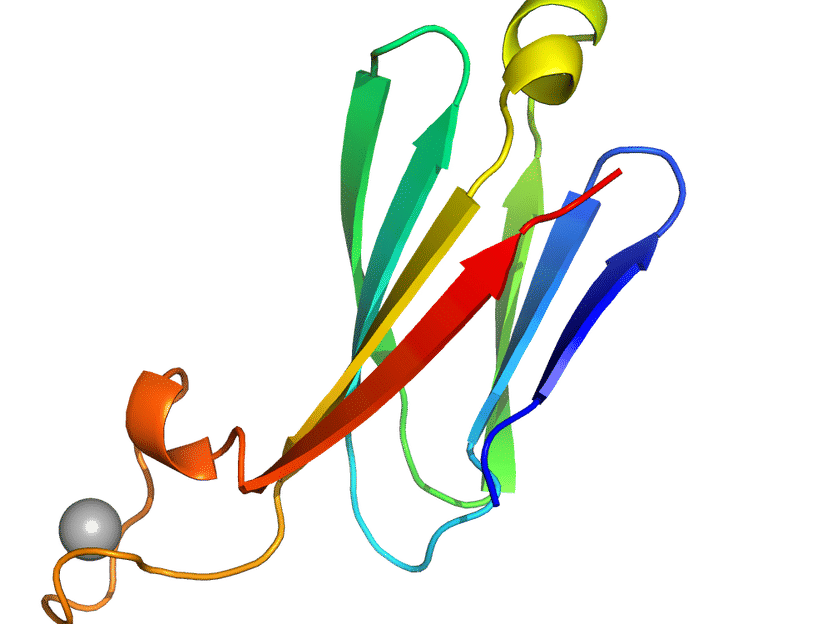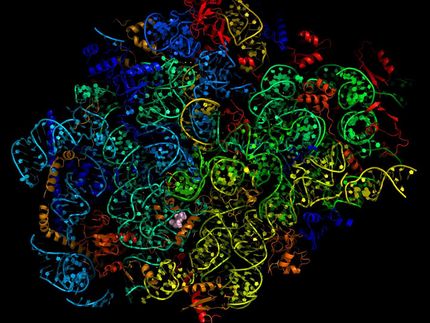New proteins that mimic immunoglobulins in antibodies could lead to more effective drug design
CSIC researchers participate in a study that uses computational design to obtain proteins with better properties and a more precise mechanism of action
Researchers from the Spanish National Research Council (CSIC) and the Institute for Protein Design have co-designed and created new proteins, non-existent in nature, with structures that mimic the immunoglobulins of antibodies, which are the proteins used by the immune system to identify and neutralize foreign bodies such as pathogenic bacteria and viruses. The work opens the door to the development of tailored and more affordable monoclonal antibody-based drugs, with applications ranging from cancer to autoimmune diseases and viral infections.

Design structure of an immunoglobulin domain with calcium binding site.
Enrique Marcos
This study describes a computational strategy to design "small immunoglobulins (proteins) like those of antibodies with tailor-made structures, high stability and with the capacity to anchor flexible areas with binding capacity to the desired target", explains Enrique Marcos, co-director of the study together with F. Xavier Gomis Rüth, both from the Institute of Molecular Biology of Barcelona (IBMB-CSIC), and David Baker, from the Institute for Protein Design at the University of Washington (USA).
The part of the antibodies that is modified is a very specific one. "The structure of all antibodies is very similar, but at their ends they differ in a small variable region that allows each antibody to specifically recognize a target," explains Marcos. This variable region is a structural framework with folded immunoglobulins, a framework to which a flexible zone is anchored that interacts with and directly recognizes the pathogen.
With this strategy, the scientists generated the new molecules (proteins) and then checked by crystallography that the structures obtained were those predicted in the models, which means that they can design them with high precision.
The work, in which teams from the University of Toronto have also participated, opens the door to the design of antibody-like proteins with structures adapted to the needs and that present better biophysical properties than the current ones, which would represent a breakthrough for the development of more accessible drugs on a global scale and making possible new mechanisms of action.
Promising monoclonal antibodies
Drugs based on monoclonal antibodies consist of modifying a part of the antibodies so that they are capable of recognizing therapeutic targets and attacking specific cells. These are the most promising and most advanced drugs in the pharmaceutical industry, especially for the treatment of different types of cancer, autoimmune diseases and, more recently, viral infections.
However, they are still very expensive therapies and there are limitations that slow down their progress, such as their low stability, large size and difficult large-scale production, among others. Therefore, they are highly expensive drugs to develop, produce and, being very unstable, also difficult to distribute, since they require adequate storage and refrigeration conditions. This new study using computational design could contribute to achieving more precise, stable and affordable drugs.
Note: This article has been translated using a computer system without human intervention. LUMITOS offers these automatic translations to present a wider range of current news. Since this article has been translated with automatic translation, it is possible that it contains errors in vocabulary, syntax or grammar. The original article in Spanish can be found here.
Original publication
Tamuka M. Chidyausiku, Soraia R. Mendes, Jason C. Klima, Marta Nadal, Ulrich Eckhard, Jorge Roel-Touris, Scott Houliston, Tibisay Guevara, Hugh K. Haddox, Adam Moyer, Cheryl H. Arrowsmith, F. Xavier Gomis-Rüth , David Baker & Enrique Marcos; "De novo design of immunoglobulin-like domains. "; Nature Communications.
Other news from the department science
Most read news
More news from our other portals
See the theme worlds for related content
Topic world Antibodies
Antibodies are specialized molecules of our immune system that can specifically recognize and neutralize pathogens or foreign substances. Antibody research in biotech and pharma has recognized this natural defense potential and is working intensively to make it therapeutically useful. From monoclonal antibodies used against cancer or autoimmune diseases to antibody-drug conjugates that specifically transport drugs to disease cells - the possibilities are enormous

Topic world Antibodies
Antibodies are specialized molecules of our immune system that can specifically recognize and neutralize pathogens or foreign substances. Antibody research in biotech and pharma has recognized this natural defense potential and is working intensively to make it therapeutically useful. From monoclonal antibodies used against cancer or autoimmune diseases to antibody-drug conjugates that specifically transport drugs to disease cells - the possibilities are enormous



















































